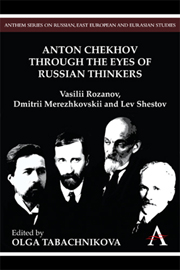 Anton Chekhov Through the Eyes of Russian Thinkers
Anton Chekhov Through the Eyes of Russian Thinkers Book contents
- Frontmatter
- Contents
- Acknowledgments
- Introduction
- List of Names
- List of Russian Cultural Concepts
- Three Brief Biographies – Rozanov, Merezhkovskii and Shestov
- Part One Vasilii Rozanov
- Part Two Dmitrii Merezhkovskii
- Part Three Lev Shestov
- 9 Lev Shestov on Chekhov
- 10 Between Tragedy and Aesthetics: Shestov's Reading of Chekhov – a Gaze Directed Within
- 11 Shestov–Chekhov, Chekhov–Shestov
- 12 Philosophy's Enemies: Chekhov and Shestov
- Notes on Contributors
11 - Shestov–Chekhov, Chekhov–Shestov
from Part Three - Lev Shestov
Published online by Cambridge University Press: 05 March 2012
- Frontmatter
- Contents
- Acknowledgments
- Introduction
- List of Names
- List of Russian Cultural Concepts
- Three Brief Biographies – Rozanov, Merezhkovskii and Shestov
- Part One Vasilii Rozanov
- Part Two Dmitrii Merezhkovskii
- Part Three Lev Shestov
- 9 Lev Shestov on Chekhov
- 10 Between Tragedy and Aesthetics: Shestov's Reading of Chekhov – a Gaze Directed Within
- 11 Shestov–Chekhov, Chekhov–Shestov
- 12 Philosophy's Enemies: Chekhov and Shestov
- Notes on Contributors
Summary
How did the philosopher Shestov interpret the work of the artist Chekhov? What was Chekhov's response to Shestov's philosophical work? These are the themes of the present chapter. What is at stake here is not a dialogue, but two independent episodes, linked by the cast of characters. The philosopher suggested an interpretation of the artist, while the artist used motifs from the philosopher's book. The former episode is exposed to everybody, but requires interpretation. The latter has been hitherto unexamined, and here is discussed for the first time. Such a symbiosis perhaps is telling of the character of the relationship between philosophy and art. As we shall see, Shestov's and Chekhov's turning to each other is no accident: they were united by a deeplyrooted desire to understand the world and life.
During his own lifetime, Lev Shestov (1866–1938) became one of the brightest stars on the world philosophical stage. This fact is much better known than the significance he had for the history of the Russian Silver Age. Only one historian of Russian culture, Avril Pyman (in her history of Russian Symbolism) would seem to have granted Shestov his due place. In general, his significance for Russian literature of the first half of the twentieth century, and especially for the Silver Age, otherwise remains ignored. And yet because Shestov's books constitute a substantial part of the intellectual context of that epoch, not taking into account his thought would leave many important texts unread.
- Type
- Chapter
- Information
- Anton Chekhov Through the Eyes of Russian ThinkersVasilii Rozanov, Dmitrii Merezhkovskii and Lev Shestov, pp. 199 - 218Publisher: Anthem PressPrint publication year: 2010


